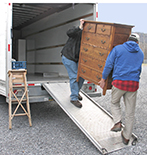“It is the maxim of every prudent master of a family, never to attempt to make at home what it will cost him more to make than to buy . . . . If a foreign country can supply us with a commodity cheaper than we ourselves can make it, better buy it of them with some part of the produce of our own industry, employed in a way in which we have some advantage.”
-Adam Smith, An Inquiry into the Nature and Causes of the Wealth of Nations, 1776
IPI believes the United States should aggressively pursue trade liberalization, which includes a willingness to lower our own trade barriers even when other countries do not respond reciprocally. Ideally, those efforts include multilateral agreements, such as the Trans-Pacific Partnership, but bilateral agreements can also promote freer trade.
American consumers bear the brunt of the protectionist impulse through higher prices on consumer goods, and American workers are best served when liberalized trade policies facilitate the export of American products throughout the world. At a time when protectionist sentiments are growing, it is important to assert that the U.S. and its workers have nothing to fear from trade, and everything to gain.
Get Your Popcorn Ready
Wednesday, November 5, the Supreme Court will hear one of the most important cases involving limited government in our lifetimes. Learning Resources, Inc. v. Trump is about whether a president has authority under the Constitution or statute to impose tariffs in the way the Trump administration has.
The Coming Fiscal Hit No One Is Talking About
If/when the Trump tariffs are found to be unconstitutional, those who have paid unconstitutional tariffs will be entitled to refunds.
Don't Import Foreign Price Controls on U.S. Pharmaceuticals
Implementing MFN for Medicaid drug reimbursement would be a long-term structural disaster in exchange for perceived short-term benefits. There are better ways to address our entitlements crisis, and Congress should pursue them.
EconLog Quotes IPI TradeByte on Congress & Tariffs
Scott Sumner kindly references IPI's recent TradeByte on Congress' impotent response to Trump's tariffs.
Broken Treaties, Broken Government
When did it become okay for a president to break treaties lawfully passed by Congress?
Coalition Letter: Tariffs Will Harm the Economy and Undermine the Trump Economic Agenda
IPI joined a number of free-market groups to urge Congress to argue that tariffs will be harmful to the U.S. economy.
Giving No Truck to Trucking
Policymakers need to begin considering new ways of funding transportation infrastructure that properly allocate the costs of maintenance and repair. We are intrigued by the idea of a commercial vehicle miles travelled tax (VMT-C) that would tax commercial vehicles by the miles driven, but which would omit passenger vehicles.
Let's Pay a Tariff!
Supplier: "Hey, John, we’ve got your order in, but I’m going to have to send you a replacement invoice."
John: "Why?"
Supplier: "Well, I have to add a 25% surcharge to the order."
Here Comes "Tarifflation"
Because tariffs, by design, raise the price of imported goods, tariffs are paid by U.S. consumers and businesses. It’s not inflation, since inflation is about the money supply, but it’s a price increase nonetheless—call it “tarifflation.”












